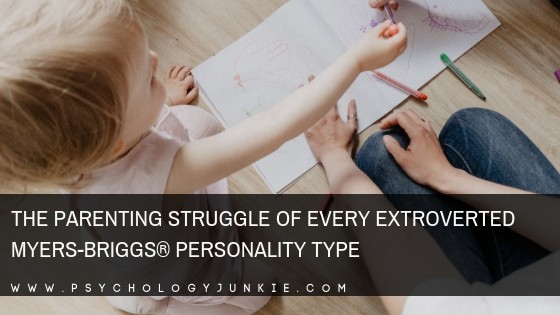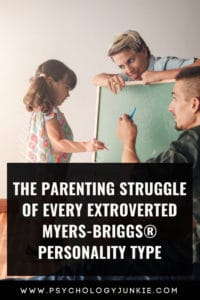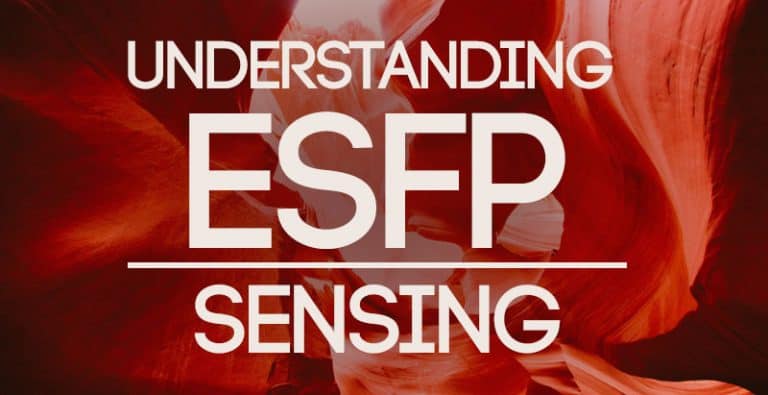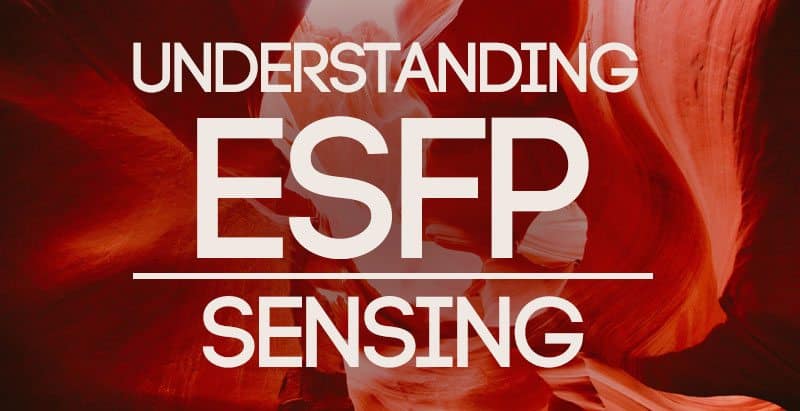The Parenting Struggle of Every Extroverted Myers-Briggs® Personality Type
Parenting is full of ups and downs, blessings and struggles, exhilaration and fear. But does your personality type make certain struggles more pronounced for you? Some types enjoy the spontaneity and unpredictability of parenting while others find it hugely stressful. Let’s take a look at some of the unique struggles that each personality type deals with when they are parenting.
Are you an introverted personality type? Check out the introverted edition of this article here.

Not sure what your personality type is? Take our new personality questionnaire!
Table of contents
Estimated reading time: 13 minutes
The Parenting Struggle of Every Extroverted Myers-Briggs® Personality Type
The ENFP Parent
ENFPs are usually enthusiastic, warm, nurturing parents. They like to tune into their children’s feelings and understand them in an intimate and compassionate way. They enjoy treating their kids to new experiences, fostering their imagination, and helping them to see the world in a way that defies tradition and the mundane.
The struggle that ENFPs regularly face has to do with restlessness. They want variety, excitement, and a regular influx of new ideas. If they’re constrained by school schedules, appointments, and a family that craves structure they can wind up feeling stuck or uninspired.
Other Struggles ENFP Parents May Experience:
- Feeling stuck in a routine
- Struggling to be firm and consistent with discipline
- Having to stay tuned in to the sensory world more than the abstract world
- Being limited or stuck at home, especially in the early years
- Lacking free time
What ENFP Parents Recommend:
Many ENFPs recommend getting regular breaks to be free, drive around, or learn something new. If you have family around that is willing to help that makes it easy. But if you’re someone who doesn’t have a strong support structure yet try finding a parents group, a babysitter, church, or community where you can get to know like-minded people or individuals who could offer assistance or babysitting!
Involve your kids in your imaginative ideas. You’d be surprised how much they enjoy experimenting, innovating, and drawing “outside the lines”.
Read This Next: The Best and Worst Parts About Being an ENFP Teenager
The ENTP Parent
ENTPs are usually energetic, resourceful, and innovative parents. They thoroughly enjoy teaching their children new ideas and skills and get a thrill from seeing their children grow into independence and self-sufficiency. ENTPs are usually tolerant and accepting, willing to hear their children’s perspectives even if they’re irreverent or atypical.
The struggle that ENTPs regularly face has to do with a loss of freedom. Just like ENFPs, ENTPs like a lot of variety and flexibility. If they are confined to a rigid household routine or aren’t allowed to be creative because of time-constraints they’ll eventually feel bored and restless.
Other Struggles ENTP Parents May Experience:
- Emotional neediness and strong reactions from children.
- Worry about never having freedom again.
- Feeling confined by routines.
- Lack of variety/monotony
What ENTP Parents Recommend:
ENTPs suggest getting regular child-care help so that you can get some time to yourself or go out and spend time with friends. Being able to count on some time for freedom is essential for you, even if at times it’s only a small amount.
Remind yourself that it’s okay to pursue your own non-parenting interests. If you’re a stay-at-home parent then make some time for your personal goals and ambitions. Remember that you being happy results in happier children! Your children will benefit from seeing you work towards your goals and pursue your own independent projects.
Read This Next: 10 Surprising Truths About ENTPs
The ENFJ Parent
ENFJ parents are involved, affirming, and encouraging. They are good at keeping a schedule and organizing activities that will encourage personal growth for their children. They have a keen interest in their children’s feelings and try to provide space of freedom for them to explain their viewpoint and dreams. Creative and visionary, ENFJ parents have a knack for creating unforgettable moments, special birthdays, and facilitating a sense of community for their child.
ENFJs tend to struggle with juggling their responsibilities and their children’s desire for spontaneity. Goal-driven and productivity-focused, ENFJs enjoy having an organized daily life. However, children inevitably disrupt schedules and it can be difficult for ENFJs to know how to prioritize all the things they take on in the course of a typical day.
Other Struggles ENFJ Parents May Face:
- Losing him or herself in the role of parent
- Over-empathizing with children and struggling with consistent, firm discipline
- Noise and chaos at home
- Knowing when to let kids handle things on their own without help
What ENFJ Parents Recommend:
Many ENFJs report that scheduling “unstructured” time into their day helps them to feel more at peace with spontaneity. They also find it helpful to talk to a good friend when the stress and unpredictability of parenting gets to be too much. Being able to laugh, vent, and find solidarity with other parents is essential for this personality type.
Even though ENFJs are extroverted, they still need time alone each day to energize themselves and experience some peace and quiet. During this time they can tap into what they really want in life and figure out the best ways to meet not only their children’s needs, but their own individual objectives.
Read This Next: 10 Talents of the ENFJ and INFJ Personality Types
The ENTJ Parent
Confident, determined, and visionary, ENTJ parents are committed to raising independent, self-sufficient children. Their form of caring isn’t to coddle or make things “easy” for their children. They feel that it’s their job to set up their children for success, which sometimes means taking a backseat and letting their children make their own mistakes and learn via experience. That said, they aren’t cold or uncaring. They are committed to meeting their children’s needs, helping them work through problems, and tuning into where they are intellectually and what their goals and dreams are.
ENTJs struggle with the pace of parenting on many occasions. Focused on productivity, ENTJs like working at a fast pace to accomplish their objectives and meet deadlines. They are also philosophical and enjoy mentally-stimulating, deep conversations. Having to slow down to “play” can make them restless if they have a lot of other things on their to-do list. They can also struggle with the mundane and tedious details or parenting. Washing the dishes only to re-wash them after the next meal can feel absolutely maddening.
Other Struggles ENTJ Parents May Face:
- Dealing with strong emotional reactions from children.
- Self-criticism and perfectionism
- Loss of free time and independence
- Being misinterpreted as “mean” when unable to muster the desired emotional response
What ENTJ Parents Recommend:
If you have free time scheduled you’ll feel better about using your time in the allotted way. If you know your children need unstructured downtime, schedule that into the day. Then in that moment you won’t feel like you should be doing something else. Also remember to slow down when your children are being emotional. Instead of instantly pointing out solutions or critiquing try to show them that you’re listening. Validate what they are going before asking them if they’d like help thinking of solutions.
Make sure that you’re getting time for yourself. Even though you’re an extrovert you still need alone time to pursue your own interests. If you don’t have child care readily available then set up some independent activities that your children can enjoy. Things like audiobooks, coloring books, legos, and play-dough can keep kids entertained for long periods of time.
Read This Next: 10 Things That Terrify ENTJs
The ESFP Parent
Energetic and compassionate, ESFPs know how to put the “fun” in parenting. They blend compassion with a sense of pragmatism to connect with their kids emotionally while giving them real-world knowledge and experience. They strive to impart a sense of wonder and adventure in their children. They are naturally playful and tend to enjoy the opportunity to “be a kid again” that parenting provides. They like having an unstructured, flexible lifestyle and are good at adapting to the unpredictable nature of family life.
ESFP parents tend to struggle the most when their family’s values and parenting styles differ from their own. If a spouse is a more “militant” disciplinarian then they can butt heads over which discipline method is best. ESFPs tend to believe in having a meeting-of-the-minds with their children, and working out a unique discipline method depending on the severity of the crime. They have very strong opinions about how they want their children raised and if their partner has a different view they can feel stressed trying to make a decision that will maintain harmony.
Other Struggles ESFP Parents May Face:
- Having to conform to a rigid, predictable schedule
- Not getting enough free time
- Loss of freedom to spend time with friends
- Over-empathizing with the hurts of children
What ESFP Parents Recommend:
Find a support group or playgroup of other parents. Getting solidarity with people who are going through the same struggles as you are will help you to feel less alone. This also helps you to get out and socialize while also providing your kids with an outlet for their energy.
As an ESFP you put a lot of energy into your children. It’s important not to burn yourself out in the process. Take some time to tune into your body – Are you getting enough rest? Are you getting adequate nutrition? Do you need some downtime to slow down your racing mind? Don’t push yourself so hard that you wear yourself out completely.
Read This Next: 10 Things ESFPs Look for in a Relationship
The ESTP Parent
Down-to-earth, energetic, and dedicated, ESTPs bring a lot of excitement and action into their children’s lives. They enjoy getting down on all fours and wrestling or taking their kids out for a game of catch. They enjoy the spontaneity of family life and are good at staying tuned into the immediate needs of their children. Free-spirited themselves, ESTPs foster independence in their children and are good at teaching them practical skills, survival skills, and flexibility.
ESTP parents tend to struggle with a loss of freedom and control in the natural busyness of family life. ESTPs like to be in charge of their own schedule and the adjustment of conforming to a routine and the “daily grind” of parenting can be rough for them at times. Having to repeat the same chores day-after-day, keep shopping lists straight, or put off their own downtime after work to connect with the kids can feel overwhelming sometimes.
Other Struggles ESTP Parents May Face:
- Dealing with highly-charged emotions from children
- Having to get used to the “slow” times in family life
- ESTP moms may feel that they don’t fit the “typical” mothering role
- Loss of independence and autonomy
What ESTP Parents Recommend:
You need a variety of activities available that will meet your need for action and your children’s need for structure. If you hate doing the dishes every day find a way to make it enjoyable (listen to your favorite music while washing the dishes, call a friend, or time yourself to see how fast you can get the dishes into the dishwasher, for example).
As an ESTP you want to respond immediately to your children’s emotions – offering solutions and giving logical advice. This can backfire if your children just want to be heard. Take a moment to just listen, affirm what they’re going through, and then ask if they’d like advice.
Don’t knock yourself for not being similar to the other parents you see out there. Some parents excel at keeping a smooth-running routine and following a set schedule day after day. But you are gifted at responding quickly to surprise scenarios and crises’ that would throw other parents off track completely. Your ability to stay active, ready, and engaged with what’s going on around you is a gift that sets you apart.
Read This Next: 10 Things You’ll Relate to if You’re an ESTP
The ESFJ Parent
ESFJ parents crave a sense of togetherness and harmony in their families. They are good at providing order and structure and tending to the practical and emotional needs of each family member. They consider themselves guardians of their children’s welfare and will do whatever it takes to provide a sense of structure, comfort, and security in the home.
Where ESFJs struggle is with the disharmony that tends to rear its ugly head in family life. Siblings fighting, teens being disrespectful, and children dealing with the inevitable hurts they encounter growing up can all feel overwhelming to ESFJ parents. They tend to feel an urge to “fix” disharmony as quickly as possible, and this can leave them burned out, stressed, and failing to resolve the underlying issues that caused the problem in the first place.
Other Struggles ESFJ Parents Face:
- The inevitable noise and chaos of family life.
- Perfectionism and burn out.
- Lack of alone time or time with friends.
What ESFJ Parents Recommend:
You will feel less overwhelmed if you have a sense of community and support. Find other parents going through the same struggles as you that you can talk freely with. Engage in playgroups and find friends and family members who can help out when life is feeling overwhelming.
Don’t feel like you have to “fix” everything when someone your family is upset. Remember that it can be beneficial for people to learn to grapple with their own emotions and solve their own problems. This doesn’t mean to abandon your children when they are upset, but if your comfort and steady presence isn’t helping them don’t beat yourself up about it. Sometimes children need to find comfort from within rather than without. This isn’t a slight against you.
Make sure that you still get time for rest and relaxation. Even as an extrovert you need some alone time to recharge and get a break from the needs and noise of everyone else in the family.
Read This Next: 7 Things That ESFJs Experience as Children
The ESTJ Parent
Dedicated, loyal, and hard-working, ESTJ parents are deeply committed to providing security for their family. They are intensely pragmatic and want to provide their children with the confidence to face life’s challenges on their own as they grow up. They want to prepare them for real life, giving them the skills and knowledge to achieve whatever goals they set before them.
Where ESTJ parents tend to struggle is with the natural noise and chaos of daily family life. They like to have a clear schedule and routine and they dislike having to switch gears unexpectedly. Having to stop in the middle of something and deal with a tantrum, emotional breakdown, or problem that seems trivial can be aggravating to them. They tend to miss having control over their own schedule and can feel overwhelmed with the responsibilities looming over them.
Other Struggles ESTJ Parents Face:
- Dealing with highly-charged emotions from children
- “Letting go” when children need to try things their own way
- Overly high standards for themselves and/or their children
- Noise and the chaotic nature of a busy family life
What ESTJ Parents Recommend:
Get opportunities to accomplish goals outside of your parenting life. If you’re a stay-at-home parent, find a hobby or volunteer opportunity that allows you some independent achievement and focus. This freedom is good for you and allows you to have control over something that’s uniquely yours.
Remember that children need to experiment and try things in new way sometimes. Remember that there’s more than one way to do something before setting limits or correcting your child when they are working on a project.
Find other parents who you can confide in when life feels chaotic and out of control. This gives you a chance to bounce ideas off of other like-minded people to know that you’re not alone and to generate solutions.
Read This Next: 10 Things You Should Never Say to an ESTJ
Are You an Introverted Parent?
Check out the introverted edition of this article here!
What Are Your Thoughts?
Did you enjoy this article? Do you have any thoughts or insights to share? Let us know in the comments!

Subscribe to Our Newsletter

Want to discover more about personality type? Get the inside scoop with Susan Storm on all things typological, along with special subscriber freebies, and discounts on new eBooks and courses! Join our newsletter today!











